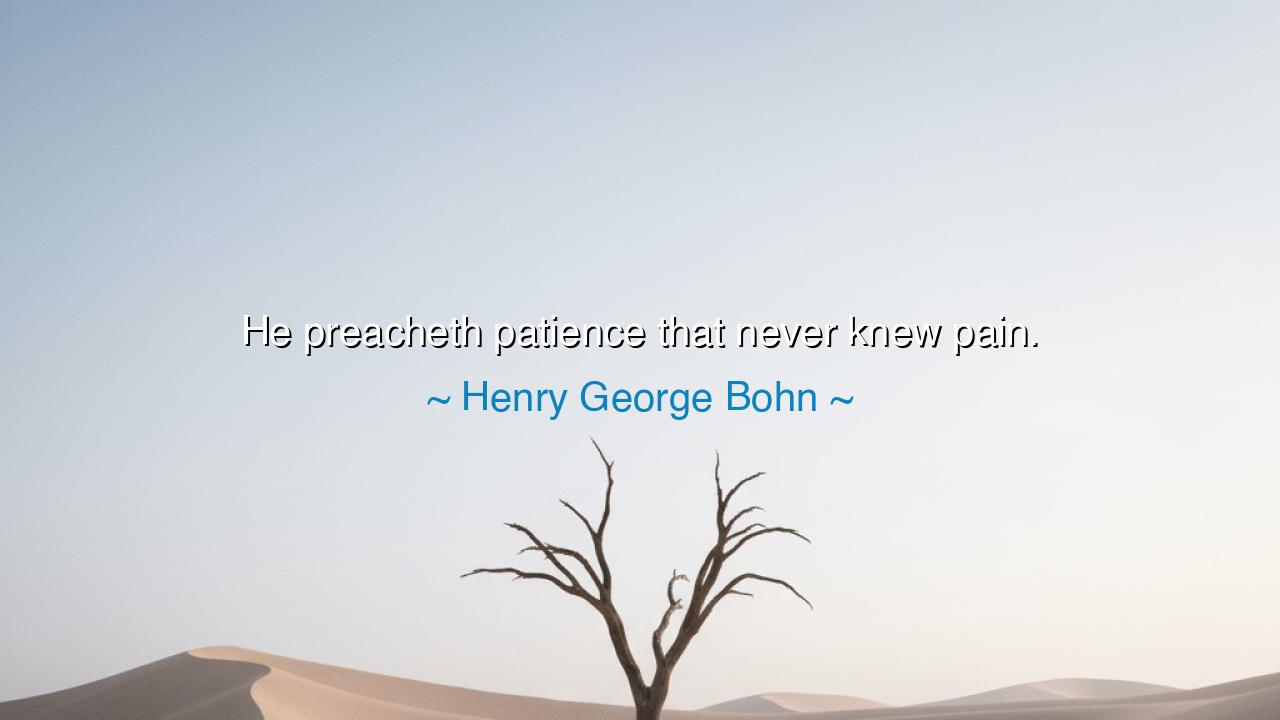
He preacheth patience that never knew pain.






Hear the words of Henry George Bohn, who spake with the sharpness of truth: “He preacheth patience that never knew pain.” In this brief saying lies a wisdom carved from the marrow of life itself. For what worth has a lesson spoken without trial? What weight carries the counsel of one who has never walked through fire? To speak of patience without having borne the sting of pain is to utter words that float upon the air, but never sink into the soul.
From the dawn of time, men have sought guidance from those who have endured. The soldier listens to the scarred veteran, not to the untested youth. The grieving mother finds comfort from one who has buried a child, not from one who speaks only in theory. For true patience is forged in the furnace of pain; it is no easy ornament, but a crown won by those who have suffered and yet endured. Bohn reminds us that words are hollow unless born of experience, and that the truest teachers are those who have bled, wept, and still chosen to rise.
Consider, O listeners, the story of Job, the ancient sufferer of scripture. His friends came, cloaked in wisdom, offering counsel that sounded righteous but was empty of understanding. They had not borne his pain, and so their words of patience were as dust upon the wind. Only Job, who endured the loss of children, health, and wealth, could speak of waiting on the divine with authority. His patience was not a sermon, but a life lived through agony. Thus we see the truth of Bohn’s saying: endurance spoken from comfort is weak, but endurance spoken from suffering is strong as iron.
So too in the history of nations. Recall Nelson Mandela, who for twenty-seven years sat in prison, his freedom stripped, his future uncertain. Many could have spoken of patience in exile, but only he, who bore the darkness of those years, could embody it. And when at last he emerged, he did not preach bitterness, but reconciliation. His voice carried power not because he was clever, but because he had known pain, and still carried the flame of patience. Such patience moved nations, where hollow words could not.
The meaning, then, is this: do not despise those who struggle, for they are the true teachers of endurance. Theories of patience spoken by those untouched by sorrow are shallow. But when the broken-hearted rise to speak, their words are rivers, quenching the thirst of the weary. It is suffering that grants depth to virtue, and pain that gives authority to counsel.
The lesson for you, O hearers of wisdom, is twofold. First, when you are in pain, know that your endurance is not wasted. It may one day become the very teaching that strengthens others. Second, when you seek guidance, look not to those who speak from untouched comfort, but to those who have walked the hard road. Their voices, though scarred, carry truth that no easy preacher can bestow.
Practical steps are clear: do not rush to lecture others on patience when you have not tasted hardship. Instead, walk beside them, listen, and learn. When your own hour of trial comes, embrace it as the fire that shapes your soul, and let it teach you compassion. Later, when others falter, you may speak—not with the shallow tone of the untouched, but with the authority of one who has endured. Thus your words will not be mere preaching, but living testimony.
Therefore, O children of tomorrow, remember Bohn’s wisdom: “He preacheth patience that never knew pain.” Let your own endurance give depth to your words, and let your pain become the forge of compassion. In this way, you will be not just a speaker of virtues, but a living witness to them. And your voice, tested by suffering, will carry the weight of truth through the ages.






AAdministratorAdministrator
Welcome, honored guests. Please leave a comment, we will respond soon